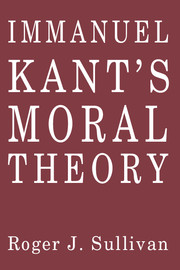Book contents
- Frontmatter
- Contents
- Preface
- Key to abbreviations and translators
- 1 Introduction
- 2 The context for Kant's moral philosophy
- Part I The nature of morality
- Part II The moral norm for persons
- Part III The norm for moral judgment
- 11 The Categorical Imperative
- 12 The Formula of Autonomy or of Universal Law: Part I
- 13 The Formula of Autonomy or of Universal Law: Part II
- 14 The Formula of Respect for the Dignity of Persons
- 15 The Formula of Legislation for a Moral Community
- Part IV Kant on history, politics, and religion
- Appendixes
- Notes
- Bibliography
- Index of names
- Index of subjects
14 - The Formula of Respect for the Dignity of Persons
Published online by Cambridge University Press: 05 June 2012
- Frontmatter
- Contents
- Preface
- Key to abbreviations and translators
- 1 Introduction
- 2 The context for Kant's moral philosophy
- Part I The nature of morality
- Part II The moral norm for persons
- Part III The norm for moral judgment
- 11 The Categorical Imperative
- 12 The Formula of Autonomy or of Universal Law: Part I
- 13 The Formula of Autonomy or of Universal Law: Part II
- 14 The Formula of Respect for the Dignity of Persons
- 15 The Formula of Legislation for a Moral Community
- Part IV Kant on history, politics, and religion
- Appendixes
- Notes
- Bibliography
- Index of names
- Index of subjects
Summary
Throughout his moral writings Kant tends to hypostatize our various powers or “faculties.” Empirical practical (prudential) reason does this, and pure practical (moral) reason does that. Although his analyses mainly concern specifically human morality, we seldom find flesh-and-blood people in the pages of his books. But Kant did recognize that there is an important emotional side to human morality, and he hoped that the Formula of Respect for the Dignity of Persons, with its emphasis on people (or persons), would “bring an Idea of reason … nearer to feeling” (Gr. 79/436). In this second formula of the Categorical Imperative he deliberately uses more emotional language than he generally allows himself, and he also stresses that the subjective foundation of human morality consists of the dispositions of self-respect and respect for others.
What the first formula does not recognize explicitly but the second formula does is that the class of “moral agents” includes (in fact, to the best of our knowledge, is coextensive with the class of) all human beings because of, as Kant put it, the “humanity in our person” in contrast to our “animality.” (See Gr. 66–67/429.) In general, what he means by the term “humanity” is that functional complex of abilities and characteristics that enables us to set ends and make rational choices. (See Gr. 82/437; Rel. 26/21; M.M. 392, 447–48.)
- Type
- Chapter
- Information
- Immanuel Kant's Moral Theory , pp. 193 - 211Publisher: Cambridge University PressPrint publication year: 1989



